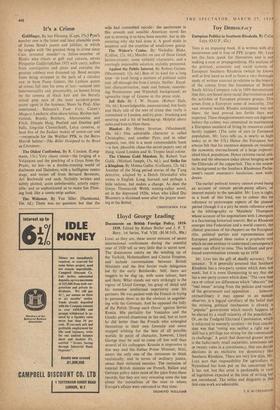Toy Democracy
European Politics in Southern Rhodesia. By Colin Leys. (O.U.P., 42s.) THIS is an imposing book. It is written with dry incisiveness and is free of PPE jargon. Mr. Leys lets the facts speak for themselves and is not making a case or propagandising. His analysis of the political, economic and social systems of European Southern Rhodesia (which he knows well at first hand as well as from a very thorough study of written sources) in relation to the history of the colony from the foundation of British South Africa Company rule in 1889 demonstrates that they are based upon racial discrimination and the activities of European pressure groups. This arises from a European sense of insecurity. The vast mineral wealth Rhodes anticipated was not there; the land proved less fertile than was expected. These disappointments were not digested before the colony was committed to maintaining a European standard of living its resources could barely support. (The ratio of cars to European population, Mr. Leys tells us, is nearly as high today as in the US.) Hence the European has always felt that his existence depends on resisting the economic encroachment of a large impover- ished black population. Hence extreme racial atti- tudes and the obsession today about hanging on to the Eldorado of the copperbelt. This is the neuro- tic background to the Southern Rhodesian Parlia- ment's recent emergency legislation. now with- drawn.
The earlier political history cannot avoid being an account of minute parish-pump affairs, of interest mainly to the specialist. Mr. Leys is right, in a book of this kind, not to colour this by reference to picturesque aspects of the pioneer period (though it is a pity he omits reference even in the bibliography to `Matabele' Thompson whose account of his negotiations with Lobengula is a fascinating historical source). But as Rhodesia emerges into Federation and a world context, the clinical precision of his chapters on the European elite, political parties and representation and European political ideas makes a prophetic text which no one anxious to understand contemporary events can afford to miss. This brilliant and pro- found anatomisation extends up to 1958.
Mr. Leys has the gift of deadly accuracy. For instance: 'It is generally assumed that Southern Rhodesia has a two-party system which does not work; but it is more illuminating to say that she has a one-party system which does.' The view that race or colour are differences which "obscure" the "real issues" arising from the policies and record of the government and opposition . . . however extraordinary it may appear to an outside observer, is a logical corollary of the belief that the existing political mechanism is already a "popular" government which merely happens to be elected by a small minority of the population. Or, on the Tredgold Electoral Commission, which is subjected to masterly scrutiny—its final conclu- sion was that 'voting was neither a right nor a skill but a privilege too strong for the commission to challenge.' A point that deserved greater stress is the ludicrously small majorities, sometimes ten or twenty votes in a constituency, that can decide elections in an exclusive toy democracy like Southern Rhodesia. There are very few slips. Mr. Leys says that responsibility for agriculture in Nyasaland has been put on the concurrent list. It has not, but this error is pardonable in via/ of legislation expected at the time of writing but not introduced. The tables and diagrams in this first-rate work are admirable.
T. It. M. 01E101110N






































 Previous page
Previous page